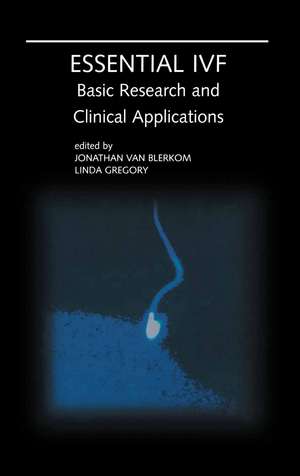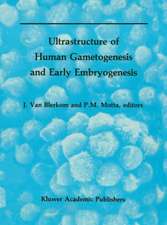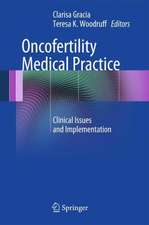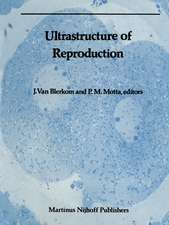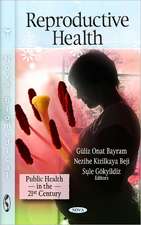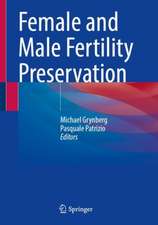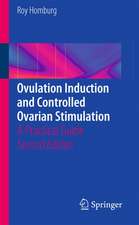Essential IVF: Basic Research and Clinical Applications
Editat de Jonathan van Blerkom, Linda Gregoryen Limba Engleză Paperback – 4 noi 2004
| Toate formatele și edițiile | Preț | Express |
|---|---|---|
| Paperback (1) | 1428.91 lei 6-8 săpt. | |
| Springer Us – 4 noi 2004 | 1428.91 lei 6-8 săpt. | |
| Hardback (1) | 1341.93 lei 3-5 săpt. | +46.80 lei 6-12 zile |
| Springer Us – 29 noi 2003 | 1341.93 lei 3-5 săpt. | +46.80 lei 6-12 zile |
Preț: 1428.91 lei
Preț vechi: 1504.11 lei
-5% Nou
Puncte Express: 2143
Preț estimativ în valută:
273.43€ • 292.38$ • 227.97£
273.43€ • 292.38$ • 227.97£
Carte tipărită la comandă
Livrare economică 17 aprilie-01 mai
Preluare comenzi: 021 569.72.76
Specificații
ISBN-13: 9781461347354
ISBN-10: 1461347351
Pagini: 648
Ilustrații: XVI, 628 p.
Dimensiuni: 155 x 235 x 34 mm
Greutate: 0.89 kg
Ediția:Softcover reprint of the original 1st ed. 2004
Editura: Springer Us
Colecția Springer
Locul publicării:New York, NY, United States
ISBN-10: 1461347351
Pagini: 648
Ilustrații: XVI, 628 p.
Dimensiuni: 155 x 235 x 34 mm
Greutate: 0.89 kg
Ediția:Softcover reprint of the original 1st ed. 2004
Editura: Springer Us
Colecția Springer
Locul publicării:New York, NY, United States
Public țintă
ResearchDescriere
There is no clearer testament to the importance and efficacy of in vitro fertilization in the treatmentof the infertilepatient than the fact that over one million babies have been born since its clinical introduction in 1978. The successof this worldwideendeavorhas evolvedto treat some of the formerly most intractable forms of infertility and requires individuals with different skills and insights whose activities are often compartmentalized into clinical, laboratory and research functions. The intent of Essential lVF is to present current issues in clinical IVF that encompass the varied activities of those engaged in this enterprise. By integrating clinical, basic research and laboratory-related aspects of human reproduction, readers with diverse interests should obtain a more complete understanding of the impact, importance and inter-relatedness of each in the progress of infertility treatment, and an appreciation of whether emerging technologies will or should contribute to this progress in the near future. The topics selected for this volume include research that has begun to explain the origins of differential follicular, gamete, embryo and uterine competence, and specific laboratory procedures and protocols that may have important clinical implications forthe generation ofdevelopmentally viable embryos. Human embryoresearchoverthe past 25 years has notonly confirmed that the developmental potential of each embryo is unique, but more importantly, demonstrated how genetic and nongenetic factors for sperm and oocyte determineembryo competencewell before fertilization. Several chapters deal with the origins of normal and compromised gametes and how those with high competence can be identified and isolated for fertilization.
Cuprins
One The Synthetic and Secretory Behaviors (Nonsteroidal) of Ovarian Follicular Granulosa Cells: Parallels to Cells of the Endothelial Cell Lineage.- Two Oocyte-Granulosa Cell Interactions.- Three Peri-Follicular Vascularity: A Marker of Follicular Heterogeneity and Oocyte Competence and a Predictor of Implantation in Assisted Conception Cycles.- Four do Biochemical Predictors of IVF Outcome Exist?.- Five Genetics of Male Infertility: Evolution of the X and Y Chromosome and Transmission of Male Infertility to Future Generations.- Six Sperm Analysis and Preparation Update.- Seven Preparation of Sperm Fractions and Individual Sperm With Low Levels of Chromosomal Aneuploidies for IVF And ICSI.- Eight Maternal Age and Oocyte Competence.- Nine Genetic Diagnosis of Metaphase II Oocytes.- Ten Oocyte Competence and In Vitro Maturation.- Eleven What is the Role of Mitochondria in Embryo Competency?.- Twelve Fundamentals of the Design of Culture Media that Support Human Preimplantation Development.- Thirteen the Biological Basis of Oocyte and Embryo Competence: Morphodynamic Criteria for Embryo Selection in In-Vitro Fertilization.- Fourteen the Enigma of Fragmentation in Early Human Embryos: Possible Causes and Clinical Relevance.- Fifteen Blastocyst Transfer Update: Pros and Cons.- Sixteen Assisted Hatching in Clinical IVF.- Seventeen Prospects for Obtaining Viable Oocytes from Cryopreserved Ovarian Tissue.- Eighteen Cryopreservation in Human Assisted Reproduction.- Nineteen Reducing the Number of Embryos to Transfer After IVF/ICSI.- Twenty Can and Should Human Embryos be “Rescued” from Developmental Demise? Methods and Biological Basis.- Twenty-One Determination of Endometrial Status and the Implantation Window.
